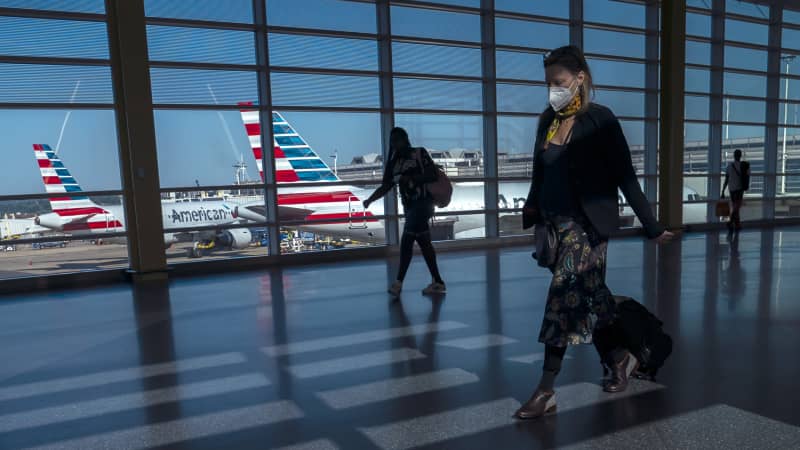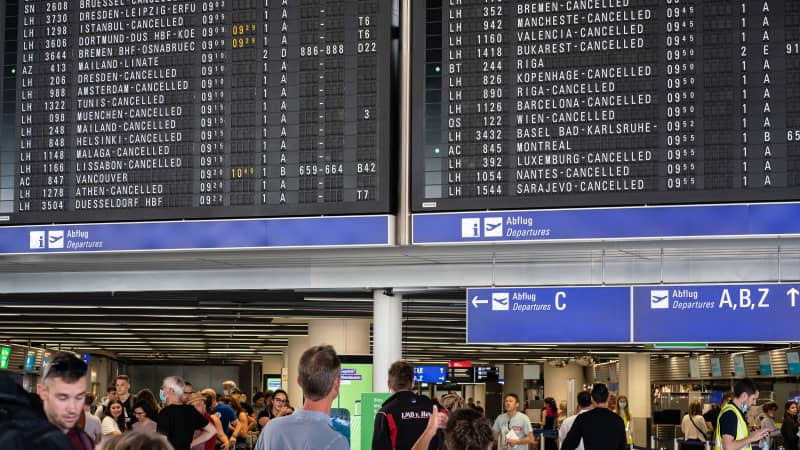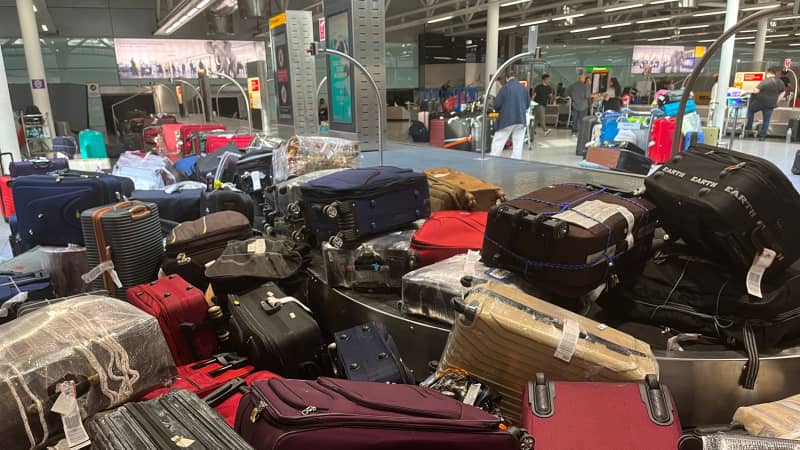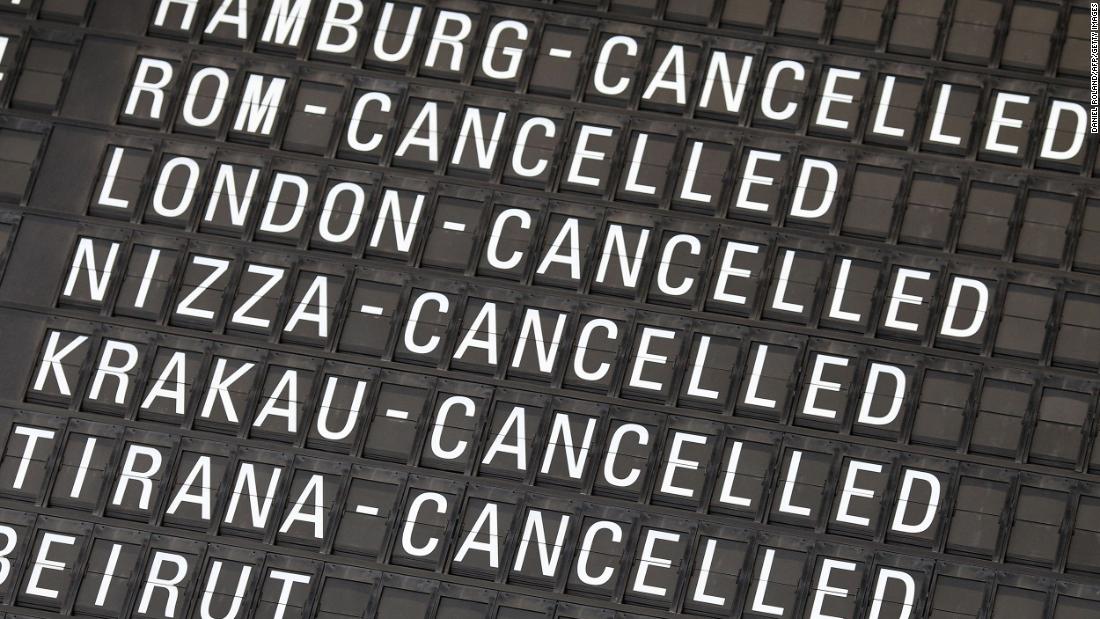(CNN) — British flight attendant Kris Major has worked in aviation for over two decades. He’s seen the industry suffer and recover in the wake of 9/11, SARS and foot and mouth disease.
Now, Major’s on the front line of what he reckons is the worst aviation crisis yet: the 2022 summer of travel chaos. Major, who serves as chair of the European Transport Workers Federation’s Joint Aircrew Committee, representing European flight attendants and pilots, says flight crew are struggling.
As global travelers return to the skies in droves after a pandemic-enforced pause, airlines and airports across the world are grappling to match supply with demand.
The result is flights canceled left right and center, luggage mislaid, and travelers losing confidence in the aviation industry as a whole. In Major’s view, it’s “absolutely shambolic.”
His words are echoed by flight attendants across the globe.
“The lack of staff, delays, cancellations, no baggage — I think it’s a very difficult situation for everybody,” Germany-based Lufthansa flight attendant Daniel Kassa Mbuambi tells CNN Travel.
“There’s some kind of breakdown happening that I believe should be preventable,” is how US flight attendant Allie Malis puts it.
Front line in the skies
When aviation ground to a halt in the early days of the pandemic, most airlines and airports either furloughed or laid off many ground and air workers. Many carriers operated a skeleton staff for the best part of the last two years.
Now, travel demand is back, and the industry is struggling to catch up and rehire. For the flight attendants still on the books, it’s a “very hard situation,” says Lufthansa’s Kassa Mbuambi, who is also chairman of German flight attendant union UFO.
Crew say this strain means occasionally operating a flight with minimum staff on board, as Kassa Mbuambi describes, or air crew sleeping at airports, as Allie Malis recounts.
Malis, who is also the government affairs representative at the Association of Professional Flight Attendants, a union representing American Airlines air crew, also describes “uncomfortable” situations where crew, delayed on incoming flights, find themselves sprinting through the airport to make their next job.
“Sometimes the passengers are cheering that you’re arriving because it means their plane’s going to go, or even that they’re upset — they think it’s your fault that the flight has been delayed when you can’t work two flights at once, although I’m sure the airlines wish we could,” she says.
The flight attendants say situations like these, along with unpredictable schedules, wreak havoc on crew mental and physical well-being.
“Sickness levels have gone through the roof, fatigue levels have gone through the roof, not because [flight attendants are] rejecting or they’re protesting in any way. It’s just that they can’t cope — they just can’t cope with the constant changes,” says British flight attendant Major.

Flight cancellations have become commonplace in the US this summer. Pictured here: travelers walk past American Airlines airplanes at Ronald Reagan Washington National Airport in July.
Nathan Howard/Getty Images
When airlines suggest current issues are due to staff absenteeism, it’s disheartening, says Malis.
“It’s kind of offensive that we’re being blamed for any type of labor shortage or operational mismanagement, because the airlines have failed to adequately plan,” she adds.
“Flight attendants are being maxed out, working the longest days we’ve had, with the shortest rest periods overnight that we’ve had and that does get you sick, that does lead to exhaustion and fatigue and weakens your immune system.”
Malis says American Airlines recently scrapped an absenteeism policy that exposed crew members to disciplinary action if they took Covid-related leave. An airline spokesperson did not comment on this change to CNN, but said “taking care of our crew members at all times, including while they’re away from home, is a priority.”
The American Airlines representative said the airline wasn’t aware of any recent reports of crew members sleeping at airports.
“If we believe there may be an issue with a crew accommodation, it is all hands on deck to prevent that from happening,” said the representative.
A spokesperson for Lufthansa said that the aviation industry as a whole is “suffering from bottlenecks and staff shortages, noticeable especially during peak periods.”
The post-pandemic travel boom was “expected — but not in this intensity,” the Lufthansa spokesperson added. Lufthansa recently canceled a slew of summer flights, with the spokesperson stating the aim was to reduce on-the-day cancellations.
While Covid and fatigue-related time off has reached 30% among Lufthansa ground staff, the German airline said crew and pilot time off “is significantly lower, in the single digits.” The Lufthansa spokesperson said that, as a result, operating flights at minimum crew capacity was not needed “on normal crew patterns.”
State of the industry

Flight attendants say the unpredictable schedules caused by cancellations and delays is tough. Pictured here: flight information boards displaying canceled flights at Germany’s Frankfurt Airport in July.
Ben Kilb/Bloomberg/Getty Images
Flight attendant contracts allow for changeable work days, so flying’s always been a job that came with a degree of unpredictability. But as the industry is stretched, flight attendants say this uncertainty has ramped up.
Major suggests unpredictable schedules, combined with current wage conditions, is why workers who left the industry during the pandemic aren’t returning.
“There’s a reason they won’t come back,” he says. “The industry has created its own problem.”
Malis echoes this: “Why would anyone want to apply to be a flight attendant or any other airline worker when we’re kind of getting worked to the bone?”
Major thinks the issue can only be solved by the industry accepting there’s a problem — and a problem that he sees as inherent to the current mode of operations, not specific to post-Covid flying.
US flight attendant Allie Malis
Through his work for pan-European aviation union, ETF, Major is advocating for upping air crew wages to match the rising cost of living and improving work-life balance.
Kassa Mbuambi agrees. “We have to provide better conditions,” he says, adding that his Germany-based union is in regular conversation with other cabin crew associations in Europe to work through solutions.
He thinks higher salaries and more structured working conditions would better reflect flight attendants’ role.
“We are not just there to provide you some drinks, but we are also there to guarantee safety,” says Kassa Mbuambi.
Passengers relations
American flight attendant Malis says passenger disruption has become less of an issue in the US since the mask mandate was lifted.
But while mask-related issues might have ceased in the US, they’re rumbling on elsewhere. Kassa Mbuambi and Major suggest that different countries having different rules creates ongoing frustration among European travelers. These frustrations can be magnified when travelers are also facing travel disruption.
“We currently have a lot of passengers traveling without their bags,” says Lufhansa’s Kassa Mbuambi. “So of course, you have a lot of angry passengers.”
Kassa Mbuambi’s plea to the traveling public is aviation workers “are doing what we can do.”
“All the staff — doesn’t matter if they’re ground staff or if they’re cabin crews — they do all the best they can do. But if you don’t have enough staff, then you can’t solve every problem.”

Many passengers are concerned about losing luggage while traveling this summer. Pictured here: uncollected suitcases at London’s Heathrow Airport.
Paul Ellis/AFP/Getty Images
Major echoes this sentiment, and also reminds passengers that air crew experience travel frustrations from the other side too. He’s heading on a family vacation soon and begrudgingly sees disruption as inevitable.
Malis points out the summer vacation season always stretches the system, suggesting this fall could “be a great opportunity to reset, to make sure our systems are working properly to handle high volumes of traffic.”
But, like Major and Kassa Mbuambi, she thinks a long-term solution can only come with revamping the current system.
“We, as flight attendants, we’re right there with our passengers, we’re in it with them, we feel their frustrations firsthand, if not even more, because this has happened to us so frequently, since we fly for a living,” says Malis.
“We want to do right by our passengers, we can see these poor people who are just trying to get to where they need to go, we can read their stress, we can see their anxiety and so we really just do want them to get to where they want to go, we want to hopefully say goodbye with a smile.”
A flight attendant’s guide to dealing with summer travel chaos
Here are some of flight attendant Allie Malis’ top tips for traveling right now:
– Pack your patience: Malis suggests travelers should leave home expecting travel disruption in some form. “I think that at least would put your expectations in the right place,” she says.
– Pack your snacks: Come prepared to fuel yourself through any delays, advises Malis. Alongside your snacks of choice, make sure you’ve got an empty water bottle and fill it up as soon as you’re past security. If your flight is grounded on the runway for any length of time, or if you find yourself in a long line, you’ll be hydrated and fed. Plus, some airlines still aren’t running their pre-Covid on-board food service, and even if they are, there might be disruptions to the service: “If the weather’s bad, if it’s really bumpy, there’s no guarantee that we’re going to be able to safely perform a beverage service,” explains Malis.
– Book early morning flights: Malis suggests earlier flights might be less disrupted, so booking first thing could be a good shout. “Usually the operation is kind of reset in the morning,” she says. And if you get shifted on to a later flight, if you’re at the airport first thing, there should be more options available. Weather-related delays also tend to occur more in the afternoon and evening, Malis adds.
– Leave buffer time: Try and avoid tight connections where you can, advises Malis. And if you’re traveling for an important event, such as a wedding, try to fly in a day or two in advance if you’re able, to give yourself the peace of mind.
Top photo: An airport display at Frankfurt Airport listing canceled flights on July 27, 2022. Source: Daniel Roland/AFP/Getty Images
